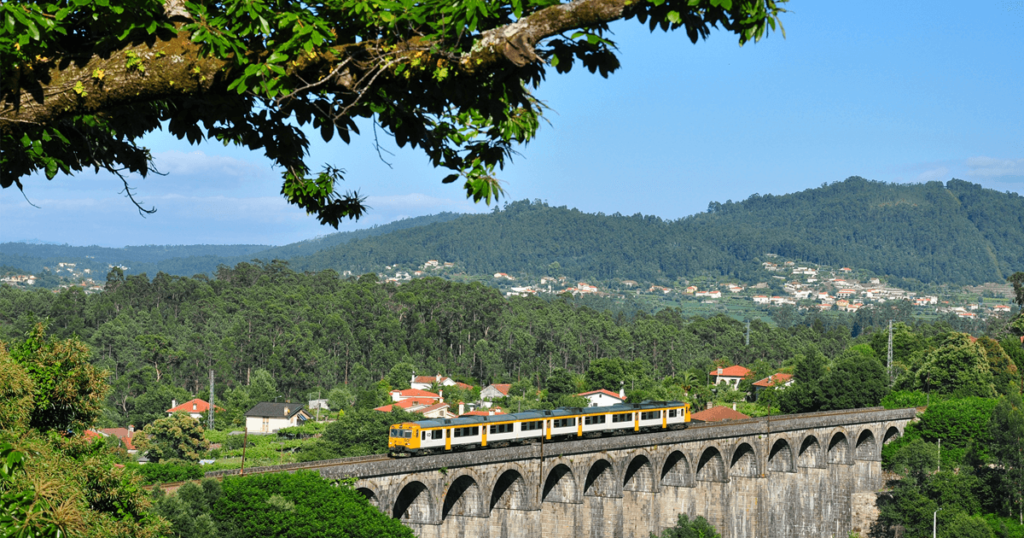
The challenge: to translate Armando Frietas Filho’s “Cartão-postal sem fôlego” (“Breathless Postcard”) from the Portuguese. The condition: complete ignorance of the Portuguese language. The result: so many imaginative renderings that this reader (1) feels like making generalizations linking ignorance to invention, and (2) has decided to choose lines from various entries to constitute a communal 17-line approximation of the original.
Here is the original:
A natureza não cuida de nada
nem olha pra trás.
Pára-raios e paraísos
e todos os verbos no infinito.
Morro
dentro da paisagem
onde as estações passam
nos relógios ao relento.
Pelas janelas do trem
ao tempo
bruscos recortes rápidos
arrancados pela raiz do ar livre:
o que a lua tira da pedra
pedaços de céu e mar
montanhas, ah! além e alheias
folhas rasgadas, deve & haver o quê?
E em qual caderno.
Here is a more-or-less faithful translation:
Nature doesn’t nurture anything
it never looks back
parasols and paradise
and every verb in the infinite
I die
within a landscape
where stations pass
by clocks fixed in the open
From the windows of a train
through time
brusque cuts quick
plucked by the root from plain air:
what the moon pulls from the stone
pieces of sky and sea
mountains, ah! Beyond and indifferent
torn leaves, thou shall & shall not what?
And in which notebook?
And here is what we—11 of us—did:
Nature nurtures nothing, [David Lehman]
neither one’s name nor one’s trousers. [Emily Winakur]
A pair of dice is paradise [Millicent Caliban]
that falls like false promises, [Erik Chaney]
words ad infinitum [Patricia Smith]
or the verbiage of infinity. [Angela Ball]
Sadness [Justin Knapp]
is born … overarching like parasols. [Charise Hoge]
For there the rivers are paradises, [Courtney Thrash]
and all the verbs and infinitives [Ralph L. Rosa]
pass as rapidly as the water flows in the river. [Elizabeth Solzurg]
I am reason’s nudist, [Emily Winakur]
like mountain peaks overlooking [Charise Hoge]
tits of rock, ah! sacred, scared, and scarred. [Erik Chaney]
Where is our cave? [Emily Winakur]
And on which page? [Courtney Thrash]
And in whose book? [Angela Ball]
For the title, I decided to go with Justin Knapp’s “Postcard from the Future,” though Courtney Thrash’s “Nihilism Shut Down The Post Office” gave it a run for the money. I also considered my favorite line of all, Millicent Caliban’s “A pair of dice is paradise,” as a possible title.
Diana Ferraro ruled herself ineligible because she knows Portuguese so I gave her, in two installments, Friedrich Holderlin’s “Hälfte des Lebens” (“Half of Life”). Here is the original:
Mit gelben Birnen hänget
Und voll mit wilden Rosen
Das Land in den See,
Ihr holden Schwäne,
Und trunken von Küssen
Tunkt ihr das Haupt
Ins heilignüchterne Wasser.Weh mir, wo nehm ich, wenn
Es Winter ist, die Blumen, und wo
Den Sonnenschein,
Und Schatten der Erde?
Die Mauern stehn
Sprachlos und kalt, im Winde
Klirren die Fahnen.
This is my free rendering, limiting myself arbitrarily to two words per line:
Yellow pears
wild roses
the lake
your swans
and kisses
your head
in water.But where,
when winter,
is sunshine
and shadow?
The walls,
silent and
cold, clatter.
And this is how Diana construed the lines:
I see your country
In your golden braids
And the wild roses
Of your woolen scarf.
I think of you,
Withholding the shine,
Hidden in a forest of kisses
Bathed by the holy water of night.Shall we ever meet,
Shall I ever find you again,
By winter, by blooming time,
Under the shining sun
Or a shattering rain, when?
Your stern stare behind the fan,
Words and wishes
Stirred by the wind, blown away.
Michael C. Rush had a go with it:
Hanging the land and sea
with wild roses, golden
birds become swans,
dipping their throats
into the night-greeting water.The same pool where I name, in winter,
flowers, and assign the sunshine
and shadows of the earth? The owls
remain speechless and cold, in wind
that clears the distance.
What have we proved? That, as T. S. Eliot said, it is possible to enjoy what we don’t understand? Yes, but we knew that already. That if you take care of the sounds, the sense takes care of itself? That poetry requires a suspension of consciousness rather than a faithful recording of same? Perhaps all these things. Justin Knapp, who teaches English, writes, “Normally, I have an idea and just try to figure out how to flesh it out; sometimes that means that the poem turns into something I didn’t intend, but it always starts with an idea. This prompt was very different. I had no inclination at all of what the poem would be, I just let my interpretation of the words guide the meaning.”
On the very week that we industriously addressed ourselves to the glories of mistranslation, I learned that the Lithuanian poet Saulius Vasilauskas has translated three of my poems: “When a Woman Loves a Man,” “Amnesia,” and “Sexism.” You can see the Lithuanian versions here:
The kicker is what happens when you let your search engine re-translate the poems into English. For example, “he is watching the ball scores and eating pretzels” becomes “he watches baseball and cremation of the guinea pigs.” It is a form of high surrealism.
I am delighted with the creative and enthusiastic response to this prompt, and I shall do my best to design one equally inspiring for next Tuesday. In the meantime, my thanks to all.
Cornell University Press wants to give a complimentary copy of Next Line, Please: Prompts to Inspire Poets and Writers—forthcoming in March of this year—to any NLP participants whose work was featured between the launch of the column in May 2014 and November 2016, the period covered in the book. To request your copy, please write to cornellpressnews@gmail.com.

